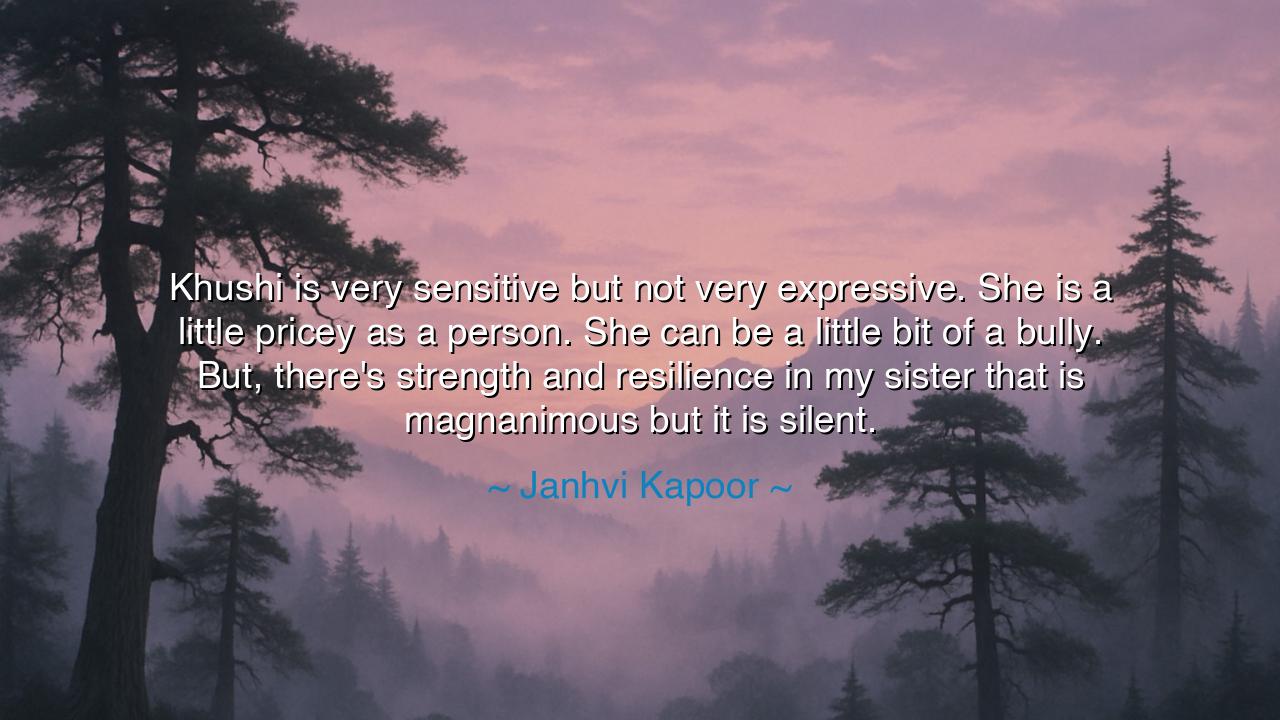
Khushi is very sensitive but not very expressive. She is a
Khushi is very sensitive but not very expressive. She is a little pricey as a person. She can be a little bit of a bully. But, there's strength and resilience in my sister that is magnanimous but it is silent.






The words of Janhvi Kapoor flow with the intimacy of kinship and the weight of truth: “Khushi is very sensitive but not very expressive. She is a little pricey as a person. She can be a little bit of a bully. But, there’s strength and resilience in my sister that is magnanimous but it is silent.” In these words is a revelation of a paradox: that the most profound power often hides itself, not in the loud or the visible, but in the quiet endurance of the soul.
To be sensitive yet not expressive is itself a trial. It is to feel deeply but struggle to unveil those feelings to the world. Many mistake such silence for coldness, but in truth it often hides a heart that trembles with more awareness than most. And in those who walk this path, there is a secret beauty: for when their power reveals itself, it is not with noise, but with the steady radiance of quiet fire. Kapoor names this quality in her sister, calling it a strength that is vast, yet cloaked in silence.
History shows us that such hidden power has always existed. Consider Rosa Parks, who with quiet dignity refused to give up her seat on a bus. She was not expressive in thunderous speeches, nor did she wield power in open displays of aggression. Yet her silent resilience, magnanimous in its courage, shifted the course of a nation. Like Khushi, her power was not in noise, but in the steady stillness of an unyielding soul.
The words also remind us of the complexity of human character. Kapoor acknowledges her sister’s flaws—her pride, her stubbornness, even her occasional bullying. And yet, beneath these thorns, she sees a hidden garden: the capacity for resilience, the ability to endure trials, to rise when pressed down, to give generously without the world noticing. True love, true understanding, sees both weakness and greatness, and recognizes that even flaws are part of the soil in which resilience grows.
This magnanimous strength in silence is perhaps the rarest kind of power. For the world often celebrates the loud, the expressive, the visible. Yet those who endure in silence, who bear pain without display, who rise quietly after every fall—these are the ones who shape destiny in ways unseen. Theirs is not the clamor of the storm, but the endurance of the mountain, unmoved, majestic, still.
The lesson for us is this: do not despise the quiet or underestimate the silent ones. Just because a person does not parade their feelings or trumpet their power does not mean they are weak. Often, their resilience is deeper than words, their strength greater than appearances. Learn to look beyond the surface, to honor the hidden depths in yourself and in others.
Practical action lies before you. When you meet one who is sensitive but not expressive, give them space, patience, and trust. When you encounter one whose strength is quiet, do not press them to prove it in noise, but honor it in silence. And in your own life, do not feel compelled always to roar. There is a time for speech, and a time for silence, and both can be mighty. Let your resilience shine not only in words, but in the way you rise each time you are struck down, in the way you endure without complaint, in the way your silent presence becomes a pillar for those around you.
So let Janhvi Kapoor’s words be remembered: that strength and resilience, when they are magnanimous and silent, are among the most powerful forces of all. For silence does not mean absence; it means depth. And the world is upheld not only by those who shout their power, but by those who carry it quietly, faithfully, enduringly—like a flame that never goes out.






AAdministratorAdministrator
Welcome, honored guests. Please leave a comment, we will respond soon